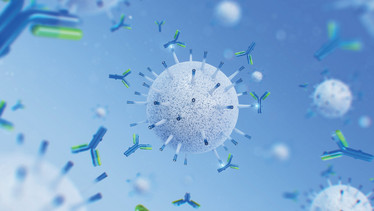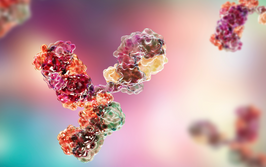Building Better Biologics – While Being Sustainable
Helping biopharma manufacturers to accelerate their time to market, with sustainable practices; here’s how Ecolab is making a difference
Hayley Crowe | | 7 min read

“Working in research, I felt that I was constantly on the cusp of a discovery, but often missing the right tools to optimize the job. I’d think, ‘If only I had this instrument, or if only this tool could do that…’”
Hayley Crowe initially trained as a bench scientist and has years of experience in drug discovery research, including at Novartis and Pfizer. After shifting her career to innovationbased scientific solutions, product marketing and business development, she found a passion for developing tools that would help many companies to accelerate drug development.
Today, she is Executive Vice President and General Manager of Ecolab’s Global Life Sciences sector. “Ecolab caught my interest because of its mission to protect what’s vital, including both human and environmental health. This is not just a slogan on a wall, but something the company truly lives.”
We caught up with Crowe to learn more about Ecolab and how it helps both patients and the planet through a focus on innovation in contamination and biomanufacturing, as well as its commitment to sustainability.
How has Ecolab evolved to stay at the forefront of the life sciences industry?
Ecolab has been around for over 100 years. Once you know the name you can never unsee it. One of our mottos is: we’re everywhere it matters. You’ll find us in places such as Marriott and Walmart, as well as in manufacturing plants and industrial facilities globally.
A key part of our approach has always been to have experts in the field working directly with customers. Our life sciences division started with critical contamination control solutions – ensuring pharmaceutical manufacturing environments were clean, contamination free, and compliant with strict regulations. Through acquisitions, we’ve expanded our capabilities. We acquired Bioquell, which specializes in environmental control, isolators, and sterilization units, across critical processes like sterility testing and brings us into emerging areas such as cell and gene therapy manufacturing. Our contamination control programs focus on reducing cleaning time through innovative automation technology. Bioquell’s technology helps with efficient startup and shutdown processes, helping to ensure clean environments with minimal downtime.
More recently, we acquired Purolite, which provides purification resins, including protein A and ion exchange, using their patented Jetting technology – making them easier to manufacture, more efficient, and capable of producing higher yields in less time.

Drug complexity and advanced modalities require specialized solutions. How is Ecolab different from competitors when it comes to new modalities, and what specific advances have you made?
I’ll break this into two sides.
On the drug complexity side, the growing diversity of drugs, from fragments to Fabs to ADCs, means there is no longer a one-size-fits-all approach to purification. One drug may purify beautifully with a specific feedstock and purification method, while another drug sees virtually no yield.
Ecolab has built a toolbox of resins that offer better yield and productivity, depending on the specific molecule and how it binds. We’ve also invested in a new and specialized bioprocessing applications lab based in King of Prussia, PA, so that our team can partner directly with customers to develop the best purification protocol for their specific molecule. Our scientists test different resins and conditions before making recommendations. We become an extension of our customers’ development teams.
On the cell and gene therapy side, we’re tackling a different set of challenges. Bioquell’s fully enclosed isolators allow for production inside a completely contained unit with automated decontamination, which is a game changer. Growing cells is a very delicate process. One contamination event – just one stray spore – and you’ve lost five weeks of work and incurred a lot of costs. I’ve been there in my own lab days, and it’s painful.
Bioquell isolators keep everything ultra-clean and safe, minimizing contamination risks. We can also assist customers with recommendations when it comes to securing the environment around the unit too.
What approaches has Ecolab implemented to decrease manufacturing costs associated with traditional biologics development?
We focus on what we call “Total Value Delivered.” Every time we introduce a new solution, we look at what customers are spending today, and how much water, waste, energy, and labor are involved.
From there, we calculate the potential savings and efficiency gains from implementing our solutions. We don’t just analyze a single step in the process; we evaluate the total impact of a process change and package this into a Total Value Delivered report. For example: “This solution will save you 15 hours of production time, reduce water usage by 25 percent, and lower your overall costs by X percent.” We also outline exactly how to achieve these results.
Purification is one of the most expensive steps in biomanufacturing, but with our Jetted resins and new ligand innovations, we can significantly reduce costs for our customers. As many customers are discovering, our chromatography solutions have the potential to significantly increase drug purity in a single step. Combined with improvements in productivity, this can impact the total cost of a drug, thereby expanding patient access and increasing manufacturer revenue.
Often, we start with a pilot to test a new approach and then adjust as needed. This tailored approach is where we excel. We’re able to adjust and create solutions that fit each facility’s unique needs. We have multiple manufacturing facilities ourselves, and we’re constantly optimizing for efficiency, just like we do for our customers. This hands-on experience makes a huge difference.
Digital technologies and AI are transforming industries everywhere. What is Ecolab doing in this space?
Ecolab has been working in the digital space for over 30 years. Today, we have a full cloud platform with AI-enabled applications designed for specific markets. One of our latest innovations is CLEEN, which automates cleaning validation, logbooks, and batch manufacturing processes. Operators follow an automated checklist on a tablet, and the system generates a time-stamped batch release at the end that integrates directly into regulatory systems ready for auditing.
CLEEN is a system that can be configured very quickly for our customers. At a single plant, CLEEN saved 60 hours of QA time and eliminated 12,000 reams of paper, translating to improved efficiency, reduced costs, and significant sustainability benefits.
Of course, implementing digital solutions isn’t just about technology; a cross-functional approach is required. You need buy-in from quality teams, plant heads, operations leaders, and digital teams. Change management is always a challenge, but once teams see the benefits in time savings of the system, momentum builds quickly.
Looking ahead, AI will take things further. I imagine a future where AI-driven agents provide real-time feedback and recommendations for process improvements. We are actively working in this area by partnering with Microsoft – bringing together world-class AI technology with Ecolab’s deep expertise in applying solutions to manufacturing and life sciences. Look out for exciting things on the horizon!
What are the key initiatives Ecolab has undertaken to promote environmental responsibility?
Ecolab was one of the early contributors to the Water Coalition and continues to play a major role in shaping water conservation strategies. We actively measure water savings across the world – from both our customers and us – and there’s a live tracker on our website. So far, we’ve saved a total of 827 billion gallons of water. We also measure savings in energy, waste and greenhouse gases.
These metrics show customers what’s possible when they work with us. The pharma industry is on a sustainability journey, but companies are at different stages – and we can help. We have processes that involve a plant assessment, allowing us to analyze a given plant’s sustainability metrics, and provide consultative guidance and practical steps to help build their sustainability roadmap.
We don’t just hand over a report and walk away. We will be there every step of the way, working alongside teams in plants to implement real change. People often love ideas on paper, but do not know how to get from where they are now to where they want to be. That’s where Ecolab’s expertise and partnership have really made a difference over the last few years. We’ll continue to play that role as new solutions emerge as part of our long term commitment to pharma.
Executive Vice President and General Manager Ecolab Life Sciences



















